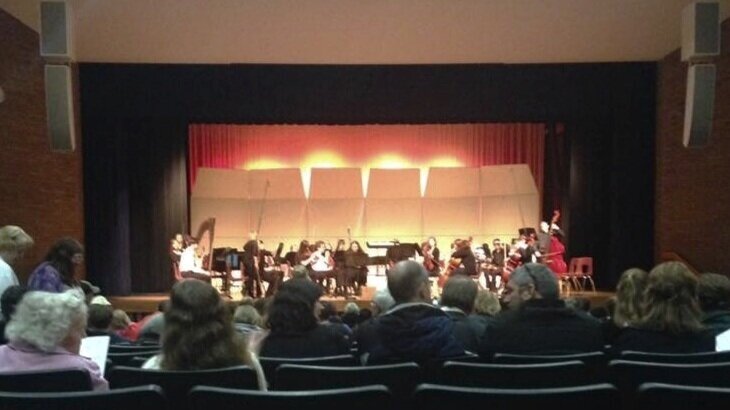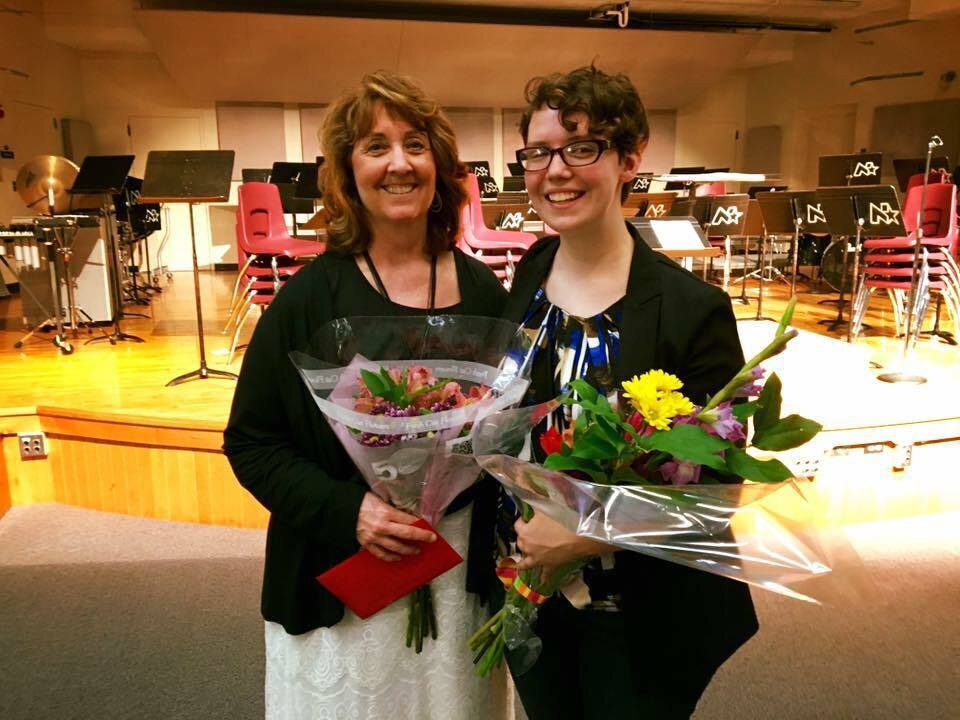
Pre-Collegiate Ensemble Commissions - Pricing Information
I strive to make all aspects of my pricing as transparent as possible. Some projects may require additional charges for features such as original text or text adaptation, electronics, multiple versions (built-in substitutions), or other special features. For the most accurate quote, please fill out the Request a Quote form.
While I do offer payment plans, please get in touch using our contact form if your school or student is experiencing financial stress and we can work together to make a project within your budget! I’m often able to reduce commission prices in exchange for good recordings, multiple performances, or other such forms of non-monetary compensation. We’re all in this together!
For pricing on college, university, and professional chamber ensemble commissions, please click here. For college, university, and professional large ensemble commissions, please click here.
How much does it cost to commission a piece?
Chamber Music (1-5 parts)
1-3 minutes: $100
3-5 minutes: $200
5-8 minutes: $400
8-12 minutes: $500
12-15 minutes: $600
15-20 minutes: $700
20+ minutes: $800 +$10 per additional minute
Includes 4-part choirs, jazz combos, and open instrumentation solos.
Chamber Music (6-10 parts)
1-3 minutes: $150
3-5 minutes: $300
5-8 minutes: $600
8-12 minutes: $750
12-15 minutes: $900
15-20 minutes: $1050
20+ minutes: $1200 +$15 per additional minute
Large Mixed Ensembles (11-19 parts)
1-3 minutes: $400
3-5 minutes: $800
5-8 minutes: $1600
8-12 minutes: $2000
12-15 minutes: $2400
15-20 minutes: $2800
20+ minutes: $3200 + $25 per additional minute
I also write for jazz band! I use to play piano, drums, vibes, and auxiliary percussion.
String Orchestra (5+ parts)
prices reflect ensembles consisting of Violin 1 and 2, Viola, Cello, and Bass. For ensembles incorporating additional instruments (such as harp, piano, percussion, or winds), additional fees are also detailed below
1-3 minutes: $200
+$10 per additional part
3-5 minutes: $400
+$10 per additional part
5-8 minutes: $800
+$10 per additional part
8-12 minutes: $1000
+$20 per additional part
12-15 minutes: $1200
+$20 per additional part
15-20 minutes: $1400
+$20 per additional part
20+ minutes: $1600 + $20 per additional minute
+$30 per additional part
Concert Band, Wind Ensemble, or Marching Band (20-24 parts)
for ensembles needing more than 24 parts, additional fees are also detailed below
1-3 minutes: $500
+$25 per additional part
3-5 minutes: $1000
+$25 per additional part
5-8 minutes: $1500
+$25 per additional part
8-12 minutes: $2000
+$50 per additional part
12-15 minutes: $2500
+$50 per additional part
15-20 minutes: $3000
+$75 per additional part
20+ minutes: $4000 + $50 per additional minute
+$75 per additional part
Symphony Orchestra (20-24 parts)
for ensembles needing more than 24 parts, additional fees are also detailed below
1-3 minutes: $800
+$25 per additional part
3-5 minutes: $1200
+$25 per additional part
5-8 minutes: $1700
+$25 per additional part
8-12 minutes: $2400
+$50 per additional part
12-15 minutes: $3200
+$50 per additional part
15-20 minutes: $4000
+$75 per additional part
20+ minutes: $5500 + $50 per additional minute
+$75 per additional part
I want to commission a work, but I can’t afford to pay all at once.
This isn’t a problem at all! In general I ask for a percentage of the commission fee up front (usually 25%-50%) and the rest is either spread out through installments or paid upon delivery of the score. For example, if you’re commissioning a 3 or 4 movement work, payments would be made after you receive each movement. If you’re working on a tight budget, I can also offer monthly payment plans—just let me know that you need to put your commission on a payment plan and we can find something that works for you! I am also happy to provide information and brief project abstracts if you’re trying to fund the commission through a grant or other funding application.
What is included in these prices?
All pricing above is for DIGITAL DELIVERY only (PDFs). For physical parts, additional fees will be calculated on a per-project basis. Every commission includes:
-Materials for picking a mood/tone/piece topic with your students—sometimes this will be a phone or video call where they tell me what kinds of things they’re interested in. For larger groups, I can provide a survey for your students to fill out so we can figure out what your students are interested in playing—it helps them get engaged with the commission and ensures everyone gets a say in what kind of piece they get to play!
-Custom cover art and front material containing program notes, performance notes, and composer bio
-Social media promotion for events on which our piece is programmed (Twitter, Instagram, Facebook, and my blog) if desired
-Piano reductions for works with voice (if desired)
-Exclusive performing rights for 1 year from delivery date
-Perpetual performance license (you never have to pay me additional fees for future performances - just send me a PDF of the program or let me know about the event so I can report the performance to my royalties company!)
-TWO guaranteed digital rehearsals (up to 60 minutes each)
-Reasonable adjustments, corrections, and re-writes even after writing period concludes
How long will it take?
The approximate durations of the writing period are as follows. The actual delivery day may change depending on what other projects I already have scheduled.
Chamber Music (1-9 parts) and String Orchestra Works
1-3 minute works: 3-5 days
3-5 minute works: 5-7 days
5-8 minute works: 7-10 days
8-12 minute works: 10-14 days
12-15 minute works: 2-3 weeks
15-20 minute works: 3-4 weeks
20-25 minute works: 4-6 weeks
25-30 minute works: 6-8 weeks
30+ minute works: 8+ weeks
Concert Band and Wind Ensemble, Symphony Orchestra, and Large Ensemble Works (10+ parts)
1-3 minute works: 2 weeks
3-5 minute works: 2-3 weeks
5-8 minute works: 3-4 weeks
8-12 minute works: 4-5 weeks
12-15 minute works: 5-6 weeks
15-20 minute works: 6-8 weeks
20-25 minute works: 8-10 weeks
25-30 minute works: 10-12 weeks
30+ minute works: 12+ weeks
My student(s) is a total beginner - can you really write something fun and interesting for them?
Excerpt from a piece for middle school string orchestra “Star in a Jar.” Students loved the chaotic and dramatic gestures in these aleatoric sections!
Yes—I firmly believe that performers of any level should have something fun, fulfilling and interesting to play! I have experience writing for performers of all levels and ages. For some students who are still learning to read music, it can be a great opportunity to write some graphic or aleatoric notation, which can help them feel more engaged and let them experiment with improvisation. To see an example of some writing I’ve done for beginners, you can check out these examples:
"Adventurous and Spunky" was written for beginner flute; the sheet music for this work is available in the Free Music section of the Library!
“For My Band Kids” was commissioned as an open instrumentation piece, so beginner soloists of any instrument could have something fun to play! The sheet music for this work is also available in the Free Music section of the Library!
“A Tiger Walks in Thunder” was written for a 5-year-old pianist and her grandfather, who commissioned a piece for the two of them to play together.
“Star in a Jar” was commissioned for an early-level string orchestra, and the students had a blast with the aleatoric sections that let them learn about new sounds on their instruments. You can read more about this piece and see score excerpts on my blog post here.
Do you have any testimonials from your past work with schools?
My former middle school band director commissioned a piece for her last concert when she retired, and it was such an honor to write something for one of my most important musical mentors!
Yes! See below for some feedback I’ve received throughout my collaborations from directors, students, and private lessons teachers!
“…I was amazed at how Kimberly took all the responses [from student surveys] and came up with a topic that wove all student ideas together. This immediately captured the students’ interests and allowed them to make connections to the piece...students have been highly engaged during our commission project and are deeply interested in the piece.”
“We all LOVE the piece…the students have really enjoyed the challenge!”
“They’re so much fun to play!”
“Both [commissions] are artistically significant and substantial additions to the repertoire, in compositional craft and expressive content.”
“I wish their parents could have seen how their faces lit up when they found out their horn could make that sound! It gave them a completely new relationship to music.”
“WOW!!…a night I will never forget!”
“Kimberly sought feedback from me on what worked and what did not and was open to changes and modifications as needed. Additionally, Kimberly was fantastic about responding to communication and kept me in the loop during the entire process.”
“[The movements] each have a unique character and they work really well on the instruments.”
“I played a bit of the pieces…and it is so amazing. I love the overall piece, the way it sounds is so mysterious, yet, certain parts have this feeling of openness.”
“Prior to the composition process, Kimberly actively sought creative input from myself and the performing ensemble, providing a meaningful artistic experience for everyone involved. Kimberly also helped bring the music to life, giving interpretive feedback during rehearsals, both virtually and in person.”
How much do you charge for original text or text adaptations?
Every project is different, but in general I base the charge for text creation or adaption based on the amount of time it will take. While you should plan on having this be something we solidify more concretely as we chat about our piece, original text is usually an additional 25% of the commission fee, and text adaptation is around 10-20% depending on how extensive the alterations are. For example, a string orchestra work of 3-5 minutes is $800. To include original text, it would be an additional $200 for a total of $1000. If you are planning to use a text in the public domain or have secured the rights for us to use the text in our piece, there will be no additional charge for text. For instrumentalist works that use vocalizations or pieces with voice that do not include words (humming, vocalizations, syllabic utterances, etc.), there is also no additional charge. My native language is English, but I am also comfortable setting works in Spanish.
How much do you charge for tape or interactive electronics?
This can vary wildly depending on the type of electronics you are envisioning, but in general: tape (also known as fixed electronics) are less expensive than interactive electronics, shorter works with electronics tend to be less expensive than longer ones, and drones, soundscapes, and ambient backing tend to be less expensive than “ensemble”-like electronics. For this reason, electronics can range anywhere from an additional 10% to 50% of the commission fee. We can chat about what you’re thinking and find a solution that works within your budget!
I’ve never commissioned a piece before - how does this process work?
It can be a little intimidating to work with another person on a new piece for the first time. I LOVE working with first-time commissioners and would be thrilled to work with you on your first commissioning experience! Below is a brief overview of how I normally collaborate:
Step One: Reach out!
Send me a message on the contact portal and let me know that you’d like to work together! It’s usually helpful to know upfront your instrumentation, a general duration and/or budget you’ve got to work with, what type of event/concerts you’d like the piece for, and any other specifics on what you’d like the piece to include (text, electronics, instrument doublings, etc.).
Step Two: Let’s chat
Once I get your message, I’ll set up a time to chat via phone or video (or, if you’re feeling shy we can stick to email!). We’ll talk about the piece in more detail, including the general mood/tone you’d like, any special techniques or gestures you’d love to see incorporated, how best to tailor the piece to your ensemble, how to engage your student(s) with the process, and how we’ll set up the deadlines and payments.
Step Three: Writing period
When I start working on the piece, I will always send an initial draft and/or sketches within the first few days so you can see what direction we’re heading and make sure we’re on the same page! For shorter works, you’ll usually get one more, nearly complete draft before the final version is delivered. For more substantial works, you’ll get drafts and/or full movements before the final score and parts are delivered. Throughout the process, I will encourage you to point out anything that seems wonky or unplayable, or let me know if we need to pivot to a different type of mood/tone. I consider all of my work collaborative and can’t wait to make this piece truly ours!
Step Four: Follow-up support
After the final delivery of the score, I will always be available to make adjustments or corrections—some things don’t come up until you’re already working on the piece months later, so don’t hesitate to reach out and ask for a change if something just isn’t working! I like to write blog posts about the pieces I’m working on, and (if you desire, of course) will include links to your social media or websites so people who read my blog can learn more about you as well! Whenever the piece is programmed, I’m happy to share events, posts, and other online materials on my own social media to better promote your event. All I ask is that I’m given a PDF or scan of any program our piece is performed on, so I can report the performance to ASCAP.













